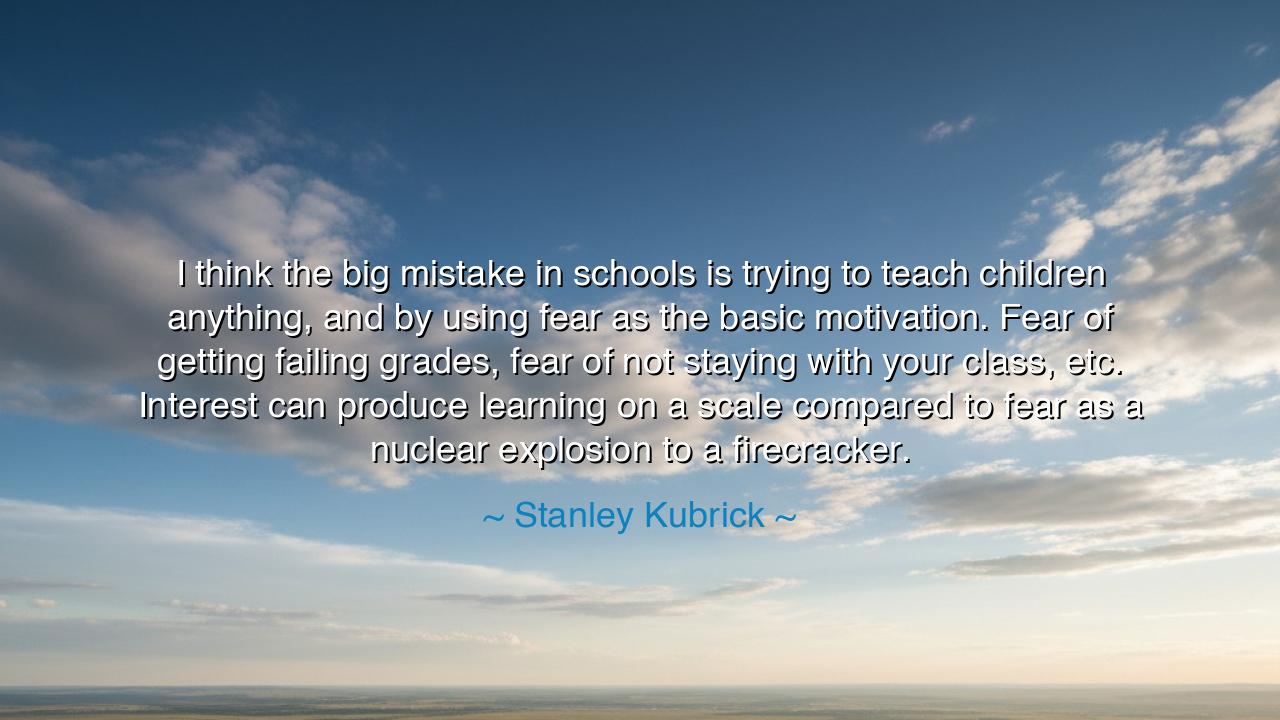
I think the big mistake in schools is trying to teach children
I think the big mistake in schools is trying to teach children anything, and by using fear as the basic motivation. Fear of getting failing grades, fear of not staying with your class, etc. Interest can produce learning on a scale compared to fear as a nuclear explosion to a firecracker.






When Stanley Kubrick said, “I think the big mistake in schools is trying to teach children anything, and by using fear as the basic motivation. Fear of getting failing grades, fear of not staying with your class, etc. Interest can produce learning on a scale compared to fear as a nuclear explosion to a firecracker,” he was not merely criticizing education — he was speaking of the very nature of human curiosity and the fire of the mind. Kubrick, the master filmmaker and thinker, understood that fear may compel obedience, but only interest awakens genius. His words are a warning to all who guide the young: that knowledge imposed by fear is like a shadow of wisdom — visible, but lifeless. True learning comes not from fear of punishment, but from the joy of discovery.
In the ancient schools of Greece, the philosopher Socrates taught through questioning, not lecturing. He did not demand memorization through threat; he led his students into wonder. Through curiosity, they were drawn toward truth like moths to light. That was learning born of interest, not coercion. Kubrick’s words revive this forgotten principle — that the mind blossoms under freedom, and withers under fear. The child who studies for grades may pass exams, but the child who studies for love of knowledge will surpass them all. Fear can control, but interest can create.
Kubrick’s comparison — fear as a firecracker, interest as a nuclear explosion — is no poetic exaggeration. It is a truth seen across all human endeavor. The scientist who pursues discovery out of fascination will achieve more than the one driven by threat or expectation. Consider Albert Einstein, who once said, “I have no special talent. I am only passionately curious.” It was curiosity, not discipline, that unlocked the secrets of the cosmos. Had Einstein been crushed beneath fear of failure, the theory of relativity might have never been born. Thus, Kubrick reminds us: greatness is born from freedom, and fear has never built a masterpiece.
In contrast, many systems of schooling have become machines of anxiety. Children learn to equate grades with worth, mistakes with shame, and curiosity with distraction. This is the great tragedy Kubrick saw — the mechanization of learning, where the heart’s flame is replaced by a ticking clock. Fear may force a student to memorize facts, but it cannot teach them to think. It may produce conformity, but never creativity. Like soldiers drilled for obedience, such students move in formation but lack vision. The result is not enlightenment, but submission.
History gives us countless lessons in this truth. In the Renaissance, artists and thinkers flourished not under fear, but under wonder. Leonardo da Vinci did not paint because a master commanded him to — he painted because he could not resist the pull of beauty and mystery. His notebooks overflowed with sketches of birds, machines, and human anatomy, born of endless curiosity. No grade could measure such brilliance. Like Kubrick himself, Leonardo lived in service to his fascination with the unknown. Interest made him immortal.
To unshackle education from fear is to restore its divine purpose — the awakening of the human soul. Teachers and parents must remember: the goal is not to produce compliant minds, but living minds, minds that question, imagine, and build. When a child’s eyes light up with curiosity, they enter the eternal conversation of humanity — the same fire that burned in Newton, Curie, Mozart, and Kubrick himself. Fear can silence that fire, but interest can turn it into a sun.
The lesson is clear and eternal: nurture interest, not anxiety. Let curiosity guide the young, even when it leads down unexpected paths. Praise their questions more than their answers. Protect the sacred joy of learning, for it is the foundation of all human progress. As Kubrick saw, the mind’s true power is not awakened by discipline, but by desire — not by punishment, but by passion.
So let this teaching endure: to inspire is greater than to instruct, and to awaken wonder is holier than to demand obedience. Fear builds walls; interest opens worlds. If we wish to raise generations of thinkers, creators, and dreamers, we must trade the whip for the flame — for in that flame lies the brilliance of the human spirit, brighter than any classroom, lasting longer than any test, and powerful enough to ignite the future.






AAdministratorAdministrator
Welcome, honored guests. Please leave a comment, we will respond soon